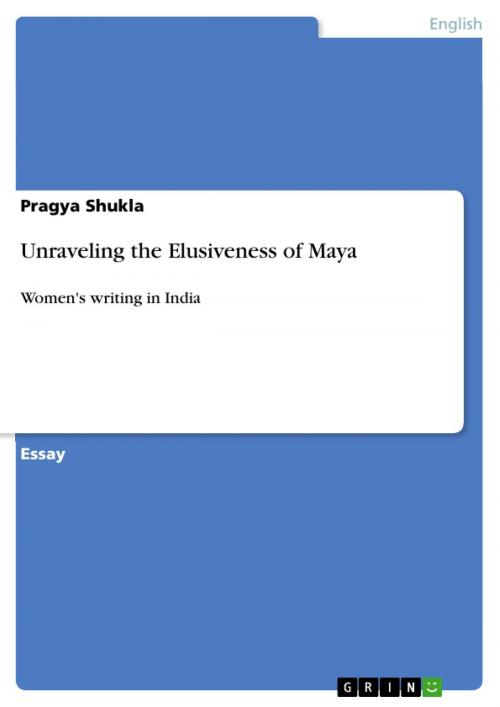Unraveling the Elusiveness of Maya
Women's writing in India
Fiction & Literature, Literary Theory & Criticism, British| Author: | Pragya Shukla | ISBN: | 9783656031499 |
| Publisher: | GRIN Verlag | Publication: | October 18, 2011 |
| Imprint: | GRIN Verlag | Language: | English |
| Author: | Pragya Shukla |
| ISBN: | 9783656031499 |
| Publisher: | GRIN Verlag |
| Publication: | October 18, 2011 |
| Imprint: | GRIN Verlag |
| Language: | English |
Essay from the year 2011 in the subject English Language and Literature Studies - Literature, Ranchi University (-), language: English, abstract: When a girl auspicates into the world of books and reading, she usually begins with a fairy tale. A Cinderella or a Beauty and the Beast allures and touches a sympathetic chord. These stories usually have a happy ending which ensures that the young minds will not go to bed with a heavy heart. A close examination of these tales, however, reveals that the treatment of girls and women in fairy tales play a major role in forming the sexual role concept of children. The good women, the heroines, are invariably beautiful, passive and powerless while female characters who are powerful are also evil and often very ugly and ill-tempered. Being powerful is mainly associated with being unwomanly. The man in a fairy tale, who sets out to seek his fortune is a stock figure and provided he has a kind heart, is sure to attain success. What is praiseworthy in males, however, is rejected in females. The counterpart of the energetic, aspiring boy is the scheming, shrewd, ambitious women. Women are excluded from holding power. Their power can only be a reflection of that of a husband or a father. Fairy tales leave an indelible impression on the minds of the young readers. When these readers sit down to spin tales and fables, it consciously encodes a patriarchal ideology. When they portray a woman - she is either good or bad. Female characters have no complexity, no subtlety, and no 'real' presence.
Essay from the year 2011 in the subject English Language and Literature Studies - Literature, Ranchi University (-), language: English, abstract: When a girl auspicates into the world of books and reading, she usually begins with a fairy tale. A Cinderella or a Beauty and the Beast allures and touches a sympathetic chord. These stories usually have a happy ending which ensures that the young minds will not go to bed with a heavy heart. A close examination of these tales, however, reveals that the treatment of girls and women in fairy tales play a major role in forming the sexual role concept of children. The good women, the heroines, are invariably beautiful, passive and powerless while female characters who are powerful are also evil and often very ugly and ill-tempered. Being powerful is mainly associated with being unwomanly. The man in a fairy tale, who sets out to seek his fortune is a stock figure and provided he has a kind heart, is sure to attain success. What is praiseworthy in males, however, is rejected in females. The counterpart of the energetic, aspiring boy is the scheming, shrewd, ambitious women. Women are excluded from holding power. Their power can only be a reflection of that of a husband or a father. Fairy tales leave an indelible impression on the minds of the young readers. When these readers sit down to spin tales and fables, it consciously encodes a patriarchal ideology. When they portray a woman - she is either good or bad. Female characters have no complexity, no subtlety, and no 'real' presence.















